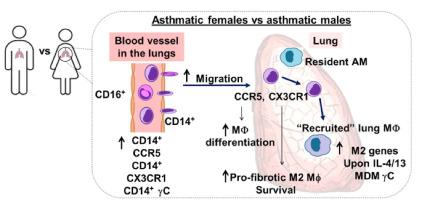Cellular Immunology ( IF 3.7 ) Pub Date : 2020-12-06 , DOI: 10.1016/j.cellimm.2020.104252 Mireya Becerra-Díaz 1 , Andrew D Lerner 2 , Diana H Yu 2 , Jeffrey P Thiboutot 2 , Mark C Liu 2 , Lonny B Yarmus 2 , Sonali Bose 2 , Nicola M Heller 3

|
Allergic asthma affects more women than men. It is mediated partially by IL-4/IL-13-driven polarization of monocyte-derived macrophages in the lung. We tested whether sex differences in asthma are due to differential IL-4 responsiveness and/or chemokine receptor expression in monocytes and monocyte-derived macrophages from healthy and allergic asthmatic men and women. We found female cells expressed M2 genes more robustly following IL-4 stimulation than male cells, as did cells from asthmatics than those from healthy controls. This likely resulted from increased expression of γC, part of the type I IL-4 receptor, and reduced IL-4–induced SOCS1, a negative regulator of IL-4 signaling, in asthmatic compared to healthy macrophages. Monocytes from asthmatic women expressed more CX3CR1, which enhances macrophage survival. Our findings highlight how sex differences in IL-4 responsiveness and chemokine receptor expression may affect monocyte recruitment and macrophage polarization in asthma, potentially leading to new sex-specific therapies to manage the disease.
中文翻译:

哮喘患者单核细胞和巨噬细胞中 M2 极化、趋化因子和 IL-4 受体的性别差异
过敏性哮喘对女性的影响比男性多。它部分由肺中单核细胞衍生的巨噬细胞的 IL-4/IL-13 驱动极化介导。我们测试了哮喘的性别差异是否是由于来自健康和过敏性哮喘男性和女性的单核细胞和单核细胞衍生的巨噬细胞中不同的 IL-4 反应性和/或趋化因子受体表达。我们发现雌性细胞在 IL-4 刺激后比雄性细胞更强烈地表达 M2 基因,哮喘患者的细胞也比健康对照的细胞更强烈。这可能是由于与健康巨噬细胞相比,哮喘患者中 γC(I 型 IL-4 受体的一部分)表达增加和 IL-4 诱导的 SOCS1(IL-4 信号传导的负调节因子)减少所致。来自哮喘女性的单核细胞表达更多的 CX3CR1,从而提高了巨噬细胞的存活率。











































 京公网安备 11010802027423号
京公网安备 11010802027423号